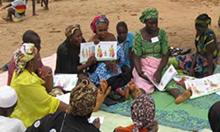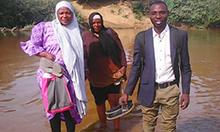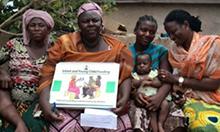January - June 2016
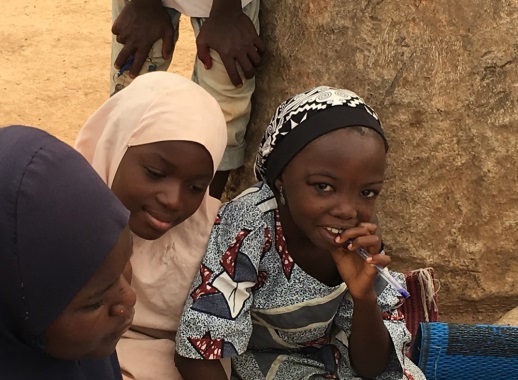
This progress report is part of the evaluation of Nigeria’s Community Infant and Young Child Feeding (C‐ IYCF) Counselling Package, a joint endeavor with the Federal Ministry of Health (FMOH) of Nigeria, the United Nations Children’s Fund (UNICEF), and SPRING.
Community‐based promotion, counseling, and support are essential to promote optimal maternal, infant, and young child nutrition (MIYCN) practices. In 2009, the United Nations Children's Fund (UNICEF) and the World Health Organization (WHO) agreed that a generic training module for community workers on IYCF counseling1 was needed to complement basic health promotion packages and health facility IYCF counseling packages. In 2010, UNICEF published the first edition of the generic C‐IYCF Counselling Package. It was updated and expanded to include a supportive supervision guide in 2012.
The package includes information and guidance for community volunteers (CV) and primary health workers to support mothers, fathers, and other caregivers to optimally feed their infants and young children. The package includes materials for training health workers and CVs to increase their knowledge of MIYCN practices and to improve skills in group facilitation, interpersonal communication and counseling, support to mothers and caregivers, problem solving, and negotiation. The interactive training is based on adult learning principles, and it focuses on the effective use of a series of counseling cards during support groups and individual counseling sessions with pregnant women and mothers of infants and young children. It also includes guidance for community mobilization and advocacy for government stakeholders and policymakers.
Little is known about the impact of the C‐IYCF Counselling Package on maternal, infant, and young child nutrition practices, despite its adoption in more than 60 countries (UNICEF NutriDash 2014)2. Nigeria offers a unique opportunity to address this gap in global evidence because the FMOH, with support from two USAID‐funded global nutrition projects—the Infant and Young Child Nutrition (IYCN) project and SPRING—have made a significant investment in adapting the generic C‐IYCF Counselling Package to the Nigerian context. It was translated into six local languages. Nigeria has committed to a national roll out of the counseling package—currently, in 29 of 36 Nigerian states where funding is secured.
In 2014, the FMOH, UNICEF, and SPRING3 initiated this mixed methods evaluation of the C‐IYCF Counselling Package in Kaduna State to assess its effectiveness when adapted for the local context and implemented at scale in one local government area (LGA), Kajuru. Specifically, the primary aims of the evaluation are to—
- assess the environment or context in terms of how it enabled or hampered the success of the C‐IYCF Counselling Package
- assess the C‐IYCF program processes, implementation achievements, and costs
- evaluate the outcomes of the C‐IYCF Counselling Package on counseling and communication skills and CVs knowledge of MIYCN
- establish the impact of the C‐IYCF program on caregivers’ knowledge, attitudes, beliefs, and practices related to MIYCN.
This progress report includes information on recent activities, key findings, and lessons learned. See the evaluation webpage for additional information.
Recent Activities
During the last six months, the focus has been on implementing the package. In addition, the research team conducted a mid‐process assessment.
Implementation
Following the training of health facility staff and health authorities, nominating CVs, training CVs, and forming support groups, the C‐IYCF Counselling Package was implemented. This included advocacy meetings with key stakeholders; community sensitization and mobilization events; support groups, home visits, and monthly review meetings; and supportive supervision for CVs and health workers. Between January and June 2016, we completed the following:
- Advocacy meetings with key stakeholders: Between January and June 2016, UNICEF, SPRING, the Kaduna State Ministry of Health (SMOH) and the Kajuru LGA health authorities continued to conduct advocacy meetings with key stakeholders from the Kaduna State government (e.g., the Ministry of Local Government and Chieftaincy Affairs) and the Kajuru LGA, especially for the LGA to release funds so that health workers can conduct supportive supervision visits. To be effective, these visits must be made periodically, or when staff turns over in the LGA or state government.
- Community sensitization and mobilization: This was a two‐day event, organized by UNICEF’s Communication for Development (C4D) team. The event prepared 400 people to perform skits related to the MIYCN practices being promoted through the C‐IYCF program.
Support groups, home visits, and monthly review meetings: All 238 CVs have remained active since being trained in June 2015. They had a one‐day supplementary training on monitoring C‐IYCF activities in March 2016 and a two‐day training in January 2016 on preparing, storing, and packaging complementary foods and conducting demonstrations for this process. UNICEF’s C4D team led the latter. It complements the C‐IYCF Counselling Packagetraining and responds to requests from CVs and community members.
Following the training in June 2015, CVs, with support from community leaders, formed 257 support groups. The number of support groups peaked at 346 groups in February 2016; and, as of June 2016, there were 337 functioning support groups. To‐date, 3,733 support group meetings have been held, with a total of 42,633 contacts made, for a total of 6,145 unique individuals reached. The majority of participants were pregnant women and mothers of children under 23 months of age (see figure below). The data show a slight decrease in the number of support group participants.
Over the past 6 months, the number of home visits that CVs reported conducting ranged between 213 and 536. To date, 5,354 home visits were conducted, reaching 2,822 unique individuals; 1,699 people were referred to the health facility for additional care. We will encourage the LGA to explore the cause of this decline in support group participants and the increase in home visits.
As reported below, with nationally harmonized C‐IYCF monitoring tools, CVs track the support groups and home visits, as well as the people reached during each group or visit. However, except for these status reports, we have not seen evidence of data being posted, reviewed, or used by CVs, health workers, or LGA staff. CVs submit their monthly report forms to health facility staff during monthly review meetings. The LGA Nutrition Focal Person (NFP), State Nutrition Officer (SNO), and Assistant State Nutrition Officer (ASNO), with support from the Study Coordinator, organize and lead these meetings. Health workers assist in collecting these data from CVs and they also report the supervisory visits they make each month. During a monthly meeting at the LGA, health workers submit aggregated data from the CVs reporting to them. These meetings have been successfully conducted each month, except in February and May, and have been an excellent forum for discussing challenges in reaching husbands and addressing specific IYCF practices, such as exclusive breastfeeding; or, more specifically, not giving infants under 6 months old water, even when the weather is hot.
Figure 1. Number of People Who Attended Support Group Meetings, by Month and Category
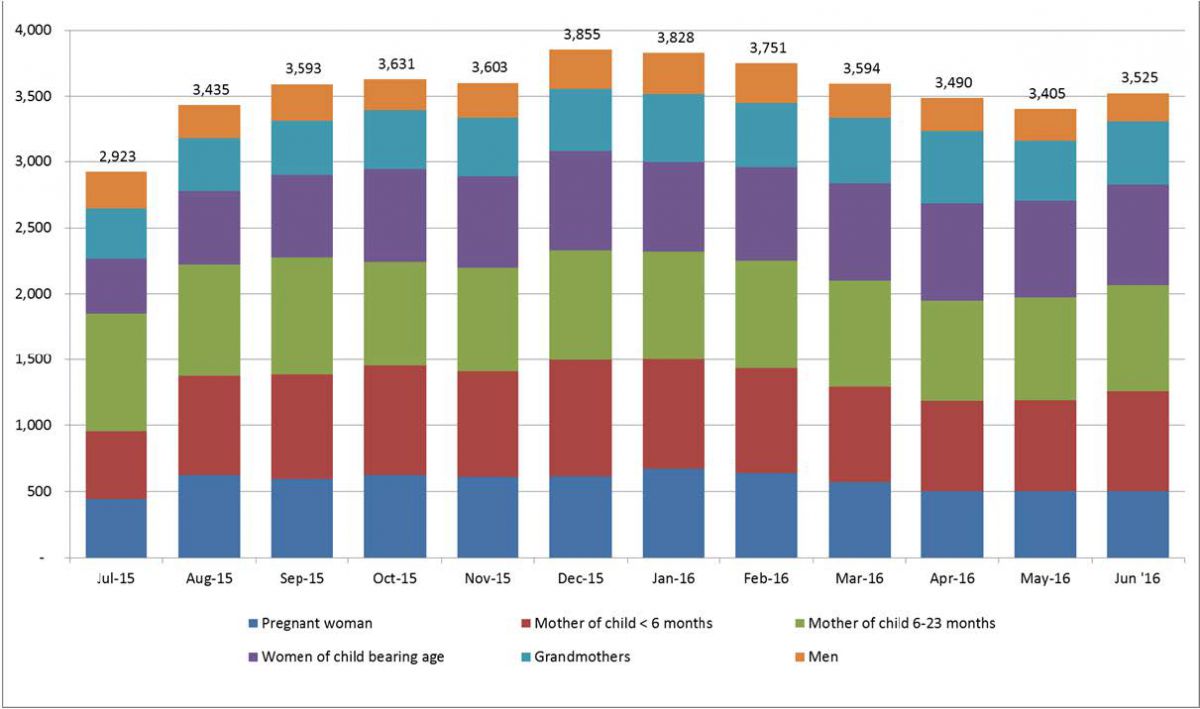
- Supportive supervision: Health facility staff have conducted a total of 2,488 supportive supervision visits—an average of 10.5 visits per CV over the 12 months that CVs have implemented C‐IYCF activities in Kajuru LGA. The Kajuru LGA NFP, the Kaduna SNO, or ASNO have made 88 supervisory visits.
Mid-Process Assessment
To understand the first two study objectives, a rapid mid‐process assessment was conducted at the end of March 2016. Specifically, the assessment aimed to determine support for implementing the C‐IYCF Counselling Package program in Kauri’s LGA, as well as how well the state and LGA team are following the implementation plans agreed to by all the partners. We identified and recorded any “deviations” before the package was scaled up in other LGAs and states in Nigeria to identify “on the ground” lessons learned and any needed adjustments to the C‐IYCF Counselling Package programming.
SPRING’s Principal Investigator (PI), Dr. Rafael Pérez‐Escamilla, and co‐PI, Dr. Sascha Lamstein, led the assessment. They traveled to Nigeria at the end of March 2016 and to the Kajuru LGA, the intervention site, between March 29 and April 2. Accompanying them were Dr. Chris Isokpunwu, evaluation co‐PI from the Head of Nutrition for the FMOH; Ms. Christine Kaligirwa, IYCF Manager from UNICEF/Abuja; Dr. Florence Oni, Nutrition Specialist from UNICEF/Kaduna; Ms. Susan Adeyemi, Study Coordinator; and Mr. Adams George Ango, LGA NFP.
As part of this assessment, the research team reviewed the existing data that is routinely collected as part of the program implementation, as well as meetings, discussions, and interviews with UNICEF; government representatives from the federal, state, and LGA levels; CVs; and support group participants.
We found that the implementation of the C‐IYCF Counselling Package program is progressing according to plan. Not only are the activities taking place, and the target coverage being reached, but all the trained CVs are still in the program. Through our multiple interactions with key informants at various levels of implementation, we also noted the importance of the enabling environment that has fostered strong enthusiasm and a movement for change in social norms for the central role of community engagement for improving MIYCN practices.
It was also clear that the Study Coordinator’s role is crucial for the successful implementation of the program in Kajuru. However, her current role is much more than coordinating the study to now include extensive oversight and coordination of program activities, as well. While the successful implementation in Kajuru was the goal and the Study Coordinator deserves praise for her achievements, her role and achievements may not be replicable in every LGA—someone with similar qualifications may not be available within the government structure.
A few other areas of concern were evident to the research team and/or were mentioned during meetings, discussions, and interviews held during the mid‐process assessment field trip:
- Implementation depends on funding from UNICEF. While the LGA budgeted funds for the C‐IYCF Counselling Package program and the state approved the budget, the LGA has not released the funds.
- Even with the large number of CVs trained and working in Kajuru, coverage of women and children under two remains at 50 percent. To change social norms and have an impact at the population level, coverage must be higher.
- Men (husbands and fathers), as well as grandmothers, play an important role in promoting and permitting adoption of MIYCN practices. However, support groups are not adequately reaching them.
- CVs showed improved knowledge and capacity to facilitate support groups. However, they did not ask participants to share experiences. Building on personal experience is an important aspect of adult learning and the experiential learning cycle.
For more information on the mid‐process assessment, please visit the evaluation webpage.
Considerations and Recommendations
Based on findings to‐date, including those from the mid‐process assessment, the research team highlights recommendations to improve the implementation, increase the long‐term success of the program, and facilitate replication elsewhere in Kaduna and other states in Nigeria.
- Transfer responsibilities to the LGA: For the program to be sustainable and scalable, every LGA needs to own and operate it, with support from the SMOH. Therefore, when possible, responsibility for funding and oversight should be transferred to the LGA. However, this may require significant reductions in the budget for the program, possibly reduced incentives (e.g., transportation reimbursement), which may take away some of the CVs’ motivation. This transfer of responsibility for funding implementation must be carefully managed.
- Build on existing systems: As Nigeria looks toward replicating and scaling up the package, it will be important to build on the existing systems, such as those established for maternal and child health days, immunization campaigns, and malaria control programs.
- Strengthen coordination, collaboration, and partnership: To build on the existing systems, implementing agencies—including UNICEF, the FMOH, SMOHs, LGAs, and other implementing partners—will need to “connect the dots” between various programs and activities being conducted across sectors and within sectors.
- Consider advocacy a routine activity: As the FMOH and SMOHs look to further scale up the C‐IYCF Counselling Package, they will need to plan for continuing advocacy and sensitization, particularly given the high turnover within the LGA leadership and, possibly, community leaders.
- Maintain or increase supportive supervision as integral: We recommend the Study Coordinator, SNO, and/or ASNO conduct a minimum of four observations of support group sessions and interviews with CVs per month, in collaboration with LGA and ward leaders. Interviewers suggest that these are extremely important to improve the quality of services provided, validate the work of CVs, and motivate CVs and community members.
- Identify opportunities to incentivize CVs: While CVs appear motivated by the result of the C‐IYCF activities, volunteering for up to 10 hours per month is a significant commitment. To sustain CVs and avoid attrition, it will be important for state and LGA officials to incentivize CVs with non‐financial actions: verbal praise, awards, certificates, or in‐kind payments.
- Engage and mobilize community leaders and health workers to connect caregivers with CVs: As the novelty of C‐IYCF activities declines, or with increased agricultural or religious activities, participation may wane. Therefore, it is important to continue organizing community dialogs and mobilization events that encourage participation. Health workers must also be reminded to refer newly pregnant women and new mothers to the support groups. Likewise, CVs should have contact information for these women, so they can reach out to them through home visits.
- Emphasize the importance of asking and listening to participants share their experiences: CVs currently ask participants questions to ensure comprehension. While this is an excellent teaching approach, a key component of adult learning is encouraging participants to consider the proposed MIYCN behavior in terms of their own experiences. We did not observe CVs asking participants to share their experiences. CVs should be encouraged to do this during each session.
- Increase and expand reach: To ensure MIYCN practices are adopted and sustained, husbands and grandmothers in C‐IYCF support groups and/or other community‐based activities need to increase their participation. To do so, CVs may be allowed and/or encouraged to establish additional support groups beyond the current limit of two, or other community members could be trained to serve as CVs.
- Capitalize on monthly review meetings: Monthly review meetings have been effectively built into operational plans for implementing the package in Kajuru. These are perfect opportunities to—
- reinforce key messages, such as the fact that even malnourished women can produce enough breastmilk for their babies and the importance of taking time to ask women to share their experiences (successes and challenges)
- conduct short refresher trainings
- disseminate priorities, such as establishing new support groups, if they can
- report, graph, and discuss trends in support group participation and home visits conducted.
Next Steps for the Evaluation Team
During the next six months—the final six months of the evaluation—we plan to complete the following activities:
- Our goal for this study was to determine if implementation of the C‐IYCF Counselling Package is effective enough to adopt as a global model for replication. Therefore, it is important that implementation follow the agreed upon implementation plans. If additional activities are conducted in Kajuru that go beyond this plan, it may not be possible for other LGAs or states to replicate or scale up the entire program, in terms of cost, time, and technical expertise.
- The Study Coordinator’s role has been essential for ensuring adherence to implementation plans. Many people interviewed echoed this sentiment. Therefore, all that the Study Coordinator has done—supervisory visits, phone calls, and more—will need to be well documented as an element of C‐IYCF Counselling Package program implementation.
- Publish, share, present, and discuss all baseline findings.
- Review, revise, and circulate for discussion detailed implementation plans for implementation and costing of the C‐IYCF Counselling Package in Kajuru.
- As plans for scaling up the C‐IYCF activities are reviewed and revised, reconsider the criteria for professionals qualified to train health authorities, health workers, and down the training cascade to CVs. This could mean adding a level to the training cascade that defines appropriate criteria and defines the role of state officials in training LGA health authorities and health workers.
- Continue to conduct observations of CVs and their support groups, as well as the satisfaction surveys for the C‐IYCF program beneficiaries.
- Develop, or encourage the LGA to develop success stories and news articles for dissemination by local newspapers and radio stations, as well as the FMOH, UNICEF, and SPRING.
- Continue to collect and report monitoring data back to the LGA.
- Prepare for the endline evaluation, which will begin in January 2017.
Footnotes
1 According to the Nigerian Integrated Infant and Young Child Feeding – A Training Course: Trainers’ Manual, “Counseling is an extremely important component of this course, as it was in the other three courses. The concept of ‘counseling’ is new to many people and can be difficult to translate. Some languages use the same word as ‘advising’. However, counseling means more than simple advising. Often, when you advise people, you tell them what you think they should do. When you counsel, you listen to people and try to understand how they feel, and help them decide what is best for them from various options or suggestions, and you help them to have the confidence to carry out their decisions. This course aims to give health workers basic counseling skills so that they can help mothers and caregivers more effectively” (Nigeria Federal Ministry of Health 2012).
2 United Nations Children’s Fund (UNICEF). 2014. Nutridash 2013: Global report on the pilot year. New York: UNICEF.
3 The Principal Investigators (PI) of this evaluation are Rafael Perez‐Escamilla of Yale University, consultant to SPRING, and Sascha Lamstein of SPRING. The co‐investigators include Peggy‐Koniz‐Booher (SPRING), France Begin (UNICEF), Arjan De Wagt (UNICEF), Christine Kaligirwa (UNICEF), Babajide Adebisi (SPRING), and Chris Isokpunwu (FMOH). In addition, this work would not have been possible without the support of Stanley Chitekwe, Davis Omotola, and Florence Oni of UNICEF, and the efforts of Susan Adeyemi, Emily Stammer, and Sarah Cunningham of SPRING.
